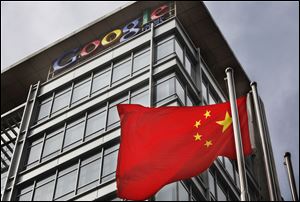
Google plays censor
8/26/2018
Google has drawn criticsm after leaked documents revealed the company’s secret plan to launch a censored search engine in China.
An internal crisis is unfolding at Google as the tech giant, which once operated with the motto “don’t be evil,” plans to assist China in the state-sponsored suppression of information.
According to leaked documents reported by the Intercept, Google has created a censored version of its search engine in China that would, among other things, block certain websites and search terms about topics such as human rights, democracy, and freedom of expression.
Click here to view more Blade editorials
Google famously pulled its services from China in 2010 after it refused to comply with demands for censorship from the Chinese government.
That inspiring stand for free inquiry has now been erased as Google prepares the censored version of its search engine for release in China early in 2019.
Google’s leadership was clearly aware of the dubious ethics of this project — code-named Dragonfly — as the company had only briefed several hundred of its more than 88,000 employees on the censored search engine. But since the project has come to light, Google staffers have expressed their frustration.
A letter circulated among Google staff, also reported on by the Intercept, notes that the Dragonfly project is an urgent issue, as the project presents serious moral and ethical issues. According to the letter, the project may violate internal company ethics code pertaining to artificial intelligence.
“Currently we do not have the information required to make ethically-informed decisions about our work, our projects, and our employment,” the letter says. “That the decision to build Dragonfly was made in secret, and progressed with the [artificial intelligence] principles in place, makes clear that the principles alone are not enough. We urgently need more transparency, a seat at the table, and a commitment to clear and open processes: Google employees need to know what we’re building.”
Google is a company that, in our digital world, wields an enormous influence over the flow of information. It is the world’s most visited website and accounts for more than 90 percent of the search engine market share.
It seems clear that Google wanted to further expand its market by reaching back into China, home to roughly 20 percent of the world’s population. As a business that wants to grow and prosper, this only makes sense.
But Google should not have sought this expansion at the expense of principles so vital to its mission. What is the point of a search engine, technically capable of accessing all the world’s information with the click of a button, if it purposefully limits a user’s access?
And China has long been known for its iron-fisted control of its citizens’ access to information that could empower them. By offering a version of its search engine that does not challenge China’s oppressive tendencies, Google becomes complicit in the oppression.
Just as Facebook CEO Mark Zuckerberg was made to appear before Congress to answer for his company’s sins, so to should Google CEO Sundar Pichai explain the actions of his company. His employees certainly deserve an explanation, but when a U.S. company as vital as Google plans on contributing to suppression of information to the benefit of a foreign power and economic competitor like China, the American people deserve an explanation, too.